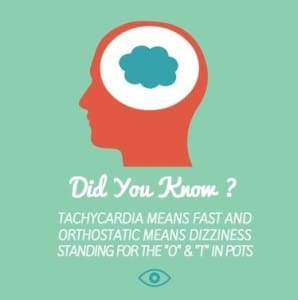Is Your Physician in the Know?
Postural Orthostatic Tachycardia Syndrome or PoTS, is one tough condition, not just for the patients, but for the physicians as well. While thankfully it doesn’t kill, it can quite often make you feel like your life is being held hostage.
 It can be a condition on its own or a comorbidity of another condition, such as Ehlers Danlos syndrome.
It can be a condition on its own or a comorbidity of another condition, such as Ehlers Danlos syndrome.
In its extreme, life-altering state, it’s pretty rare and extremely misunderstood. Recently the charity PoTS UK, teamed up with researchers and conducted the biggest ever survey of people—mainly women—living with the condition. The research, “A profile of patients with postural tachycardia syndrome and their experience of healthcare in the UK,” is published in the British Journal of Cardiology.
PoTS
The article covered causes, symptoms and treatment options. You can find the whole survey here. Here are a few excerpts:
Postural tachycardia syndrome (PoTS) is a recently recognized condition that usually affects younger women, who develop symptoms of orthostatic intolerance and a persistent tachycardia on standing upright. Healthcare professionals, patients and the national patient support group (PoTS UK) together created a survey, and the responses of 779 UK PoTS patients were analyzed. The most common symptoms of PoTS at presentation were the triad of fatigue, lightheadedness and palpitations. Mobility, ability to work or attend education, and quality of life were significantly restricted. Cardiologists, followed by patients, were most likely to be the first to suggest the diagnosis of PoTS. Patients waited a mean of almost four years from presentation to obtain their diagnosis and, meantime, psychiatric mislabeling was common. Advice given to patients regarding lifestyle changes was variable, and those referred to specialist practitioners for help, found practitioners had limited knowledge about management of PoTS. Increased education of healthcare professionals and improved services for patients are recommended.
And this is key. Even if a health professional has heard of PoTS, their knowledge can be incomplete or based on faulty assumptions. Treatments can vary depending on whether your symptoms are blood pressure or cardiac arrhythmia driven, so a comprehensive understanding is crucial to managing the condition. The report says of PoTS:
Diagnosis is usually made by active stand test or tilt-table testing. Few treatments for PoTS have been tested in randomized-controlled trials. Patients are initially managed with increased fluid and salt intake to increase blood volume, avoidance of symptom triggers (heat, prolonged standing, alcohol, drugs that induce tachycardia or hypotension), small frequent meals (low in refined carbohydrates), graded exercise (initially in a horizontal position) and compression garments to reduce venous pooling. Drug treatment can be aimed at reducing tachycardia (low-dose beta blockers, ivabradine, pyridostigmine), vasoconstriction (midodrine), boosting blood volume (fludrocortisone, desmopressin) or for their sympatholytic effects in hyperadrenergic PoTS (clonidine, methyl dopa).
Interestingly, 92% of the survey respondents were female and half had an additional diagnosis, such as EDS. Many reported fatigue as one of the most debilitating symptoms. Physicians often call conditions like this ‘benign’ i.e., you don’t die from it. But we believe it to be anything but benign since it can be utterly life-altering. The report goes on to say:
In only 7% of cases did the GP suggest PoTS as a diagnosis. This may be due to lack of awareness in primary care about PoTS or the non-specific and multiple symptoms that are associated with PoTS. However, it is possible to undertake a 10-minute stand test in a consulting room, and perhaps this should be considered in patients with relevant medically unexplained symptoms or chronic fatigue, especially if there is a postural link to symptoms.
According to the survey, the impact of PoTS is considerable, with 23% becoming wheelchair users and 37% are unable to work. The most important recommendations in the survey report are education of health professionals and the need to improve accessible and relevant rehabilitation services.
Request An Appointment
At Precision Vascular & Interventional Radiology, we feel we already know and understand this condition. This gives us a leg up in helping you get your life back if you have been diagnosed with or showing symptoms of PoTS. The expert doctors at Precision VIR can make recommendations to give you the best treatment possible.
Our goal is to deliver the most innovative, effective, safest and compassionate medical care. We specialize in minimally invasive interventions treating a wide gambit of conditions. We have expertise in all vascular disease and all minimally invasive procedures. We are committed to excellence in the field of Interventional Radiology and minimally invasive surgery. At Precision VIR, we focus on being expert consultants to our referring physicians as well as providing top notch care to our patients.
Request Appointment
Meet Our Expert Doctors
 It can be a condition on its own or a comorbidity of another condition, such as Ehlers Danlos syndrome.
It can be a condition on its own or a comorbidity of another condition, such as Ehlers Danlos syndrome.